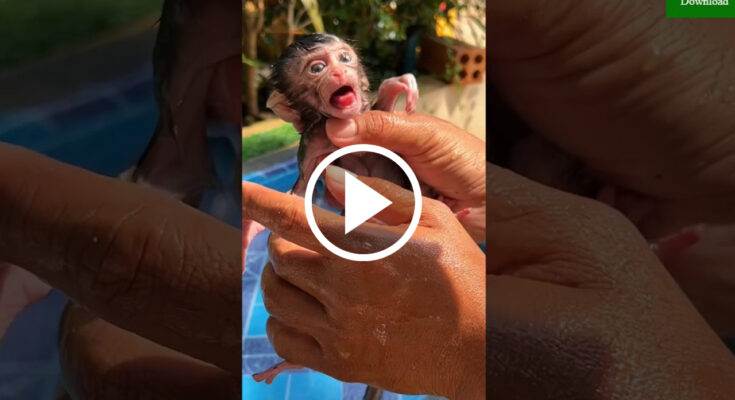Caring for and bathing a baby monkey, particularly if it is under one year old, requires specialized knowledge and attention. Here are some guidelines to help you:
General Care
Consult a Veterinarian:
Before you begin caring for a baby monkey, consult a veterinarian who specializes in exotic animals. They can provide you with specific care instructions and vaccinations.
Proper Diet:
Ensure you provide a balanced diet appropriate for the species. This often includes fruits, vegetables, and specially formulated monkey foods.
Monitor the baby monkey’s food intake and adjust as needed for growth.
Socialization:
Baby monkeys are highly social animals. If possible, ensure they have social interaction with either humans or other monkeys.
Environment:
Create a safe and enriching environment. Provide climbing structures, toys, and hiding spots to meet their social and physical needs.
Ensure their habitat temperature and humidity levels are appropriate.
Health Monitoring:
Regularly check for signs of illness (like lethargy, poor appetite, or abnormal behavior) and consult a vet if you notice anything unusual.
Bathing
Frequency:
Baby monkeys usually don’t require frequent baths. A light cleaning with a damp cloth may suffice. Only bathe them when necessary, such as if they become particularly dirty.
Water Temperature:
Use lukewarm water. Check the temperature with your wrist to ensure it’s comfortable.
Bathing:
Use a shallow tub or basin. Never submerge a baby monkey; it can panic.
Gently wet the fur and apply a small amount of mild soap that is safe for animals. Make sure to avoid getting soap in their eyes, mouth, or ears.
Rinsing:
Thoroughly rinse the soap out with clean, lukewarm water. Ensure no residue is left.
Drying:
Use a soft towel to gently pat the monkey dry. You can also let it air dry in a warm, safe environment.
Post-Bath Care:
After the bath, check the monkey for any signs of stress or discomfort. Avoid bathing too frequently, as it can strip their skin of natural oils.
Safety and Welfare
Supervision:
Always supervise the baby monkey during activities, especially near water or during play.
Handling:
Handle the monkey gently and regularly to ensure it becomes accustomed to human interaction without becoming overly dependent.
Legal Considerations:
Check the legal regulations regarding monkey ownership in your area. Some places have restrictions or require special permits.
Remember that caring for any primate is a significant responsibility. Ensure you have done thorough research and are prepared for the long-term commitment that comes with it.
